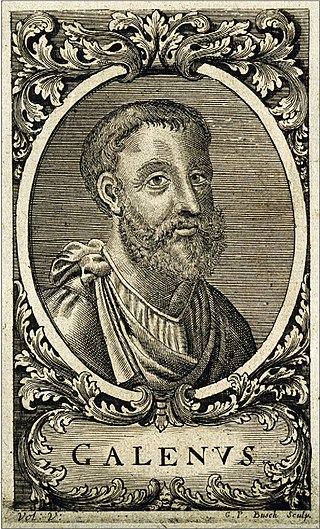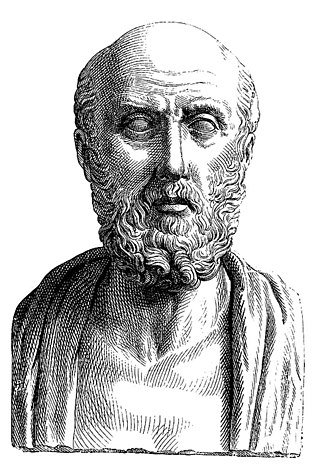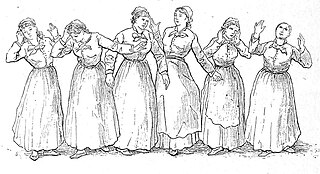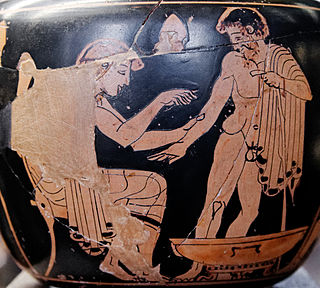
Mind and Madness in Ancient Greece: The Classical Roots of Modern Psychiatry is a medical book by Bennett Simon. It was published by Cornell University Press in 1978 and reprinted on August 31, 1980. [1] [2] [3] [4]

Mind and Madness in Ancient Greece: The Classical Roots of Modern Psychiatry is a medical book by Bennett Simon. It was published by Cornell University Press in 1978 and reprinted on August 31, 1980. [1] [2] [3] [4]

Aelius Galenus or Claudius Galenus, often Anglicized as Galen or Galen of Pergamon, was a Roman Greek physician, surgeon and philosopher. Considered to be one of the most accomplished of all medical researchers of antiquity, Galen influenced the development of various scientific disciplines, including anatomy, physiology, pathology, pharmacology, and neurology, as well as philosophy and logic.

The history of medicine is both a study of medicine throughout history as well as a multidisciplinary field of study that seeks to explore and understand medical practices, both past and present, throughout human societies.

The Hippocratic Oath is an oath of ethics historically taken by physicians. It is one of the most widely known of Greek medical texts. In its original form, it requires a new physician to swear, by a number of healing gods, to uphold specific ethical standards. The oath is the earliest expression of medical ethics in the Western world, establishing several principles of medical ethics which remain of paramount significance today. These include the principles of medical confidentiality and non-maleficence. As the seminal articulation of certain principles that continue to guide and inform medical practice, the ancient text is of more than historic and symbolic value. It is enshrined in the legal statutes of various jurisdictions, such that violations of the oath may carry criminal or other liability beyond the oath's symbolic nature.

Hysteria is a term used colloquially to mean ungovernable emotional excess and can refer to a temporary state of mind or emotion. In the nineteenth century, female hysteria was considered a diagnosable physical illness in women. It is assumed that the basis for diagnosis operated under the belief that women are predisposed to mental and behavioral conditions; an interpretation of sex-related differences in stress responses. In the twentieth century, it shifted to being considered a mental illness. Many influential people such as Sigmund Freud and Jean-Martin Charcot dedicated research to hysteria patients.

Pedanius Dioscorides, "the father of pharmacognosy", was a Greek physician, pharmacologist, botanist, and author of De materia medica —a 5-volume Greek encyclopedia about herbal medicine and related medicinal substances, that was widely read for more than 1,500 years. For almost two millennia Dioscorides was regarded as the most prominent writer on plants and plant drugs.

In 19th-century psychiatry, monomania was a form of partial insanity conceived as single psychological obsession in an otherwise sound mind.

Adolf Meyer was a Swiss-born psychiatrist who rose to prominence as the first psychiatrist-in-chief of the Johns Hopkins Hospital (1910-1941). He was president of the American Psychiatric Association in 1927–28 and was one of the most influential figures in psychiatry in the first half of the twentieth century. His focus on collecting detailed case histories on patients was one of the most prominent of his contributions. He oversaw the building and development of the Henry Phipps Psychiatric Clinic at Johns Hopkins Hospital, opened in April 1913, making sure it was suitable for scientific research, training and treatment. Meyer's work at the Phipps Clinic is possibly the most significant aspect of his career.

The Cornell University Press is the university press of Cornell University; currently housed in Sage House, the former residence of Henry William Sage. It was first established in 1869, making it the first university publishing enterprise in the United States, but was inactive from 1884 to 1930.
Lawrence Irvin Conrad is a British historian and scholar of Oriental studies, specializing in Near Eastern studies and the history of medicine. He currently serves as historian for the Wellcome Institute for the History of Medicine in London.

Ancient Greek medicine was a compilation of theories and practices that were constantly expanding through new ideologies and trials. The Greek term for medicine was iatrikē. Many components were considered in ancient Greek medicine, intertwining the spiritual with the physical. Specifically, the ancient Greeks believed health was affected by the humors, geographic location, social class, diet, trauma, beliefs, and mindset. Early on the ancient Greeks believed that illnesses were "divine punishments" and that healing was a "gift from the Gods". As trials continued wherein theories were tested against symptoms and results, the pure spiritual beliefs regarding "punishments" and "gifts" were replaced with a foundation based in the physical, i.e., cause and effect.

Oribasius or Oreibasius was a Greek medical writer and the personal physician of the Roman emperor Julian. He studied at Alexandria under physician Zeno of Cyprus before joining Julian's retinue. He was involved in Julian's coronation in 361, and remained with the emperor until Julian's death in 363. In the wake of this event, Oribasius was banished to foreign courts for a time, but was later recalled by the emperor Valens.

Medicine in ancient Rome was highly influenced by ancient Greek medicine, but also developed new practices through knowledge of the Hippocratic Corpus combined with use of the treatment of diet, regimen, along with surgical procedures. This was most notably seen through the works of two of the prominent Greek physicians, Dioscorides and Galen, who practiced medicine and recorded their discoveries. This is contrary to two other physicians like Soranus of Ephesus and Asclepiades of Bithynia, who practiced medicine both in outside territories and in ancient Roman territory, subsequently. Dioscorides was a Roman army physician, Soranus was a representative for the Methodic school of medicine, Galen performed public demonstrations, and Asclepiades was a leading Roman physician. These four physicians all had knowledge of medicine, ailments, and treatments that were healing, long lasting and influential to human history.
Psychiatry is the medical specialty devoted to the diagnosis, prevention, and treatment of deleterious mental conditions. These include various matters related to mood, behaviour, cognition, and perceptions.
Vivian Nutton FBA is a British historian of medicine who serves as Emeritus Professor at the UCL Centre for the History of Medicine, University College London, and current President of the Centre for the Study of Medicine and the Body in the Renaissance (CSMBR).
The word schizophrenia was coined by the Swiss psychiatrist Eugen Bleuler in 1908, and was intended to describe the separation of function between personality, thinking, memory, and perception. He introduced the term on 24 April 1908 in a lecture given at a psychiatric conference in Berlin and in a publication that same year. Bleuler later expanded his new disease concept into a monograph in 1911, which was finally translated into English in 1950.

This bibliography of Greece is a list of books in the English language which reliable sources indicate relate to the general topic of Greece.

De materia medica is a pharmacopoeia of medicinal plants and the medicines that can be obtained from them. The five-volume work was written between 50 and 70 CE by Pedanius Dioscorides, a Greek physician in the Roman army. It was widely read for more than 1,500 years until supplanted by revised herbals in the Renaissance, making it one of the longest-lasting of all natural history and pharmacology books.
Medical History is a peer-reviewed academic journal covering the history of medicine. It was established in 1957. The journal is edited by Sanjoy Bhattacharya and is published by Cambridge University Press.
Insanity in Ancient and Modern Life, with chapters on its prevention is a medical book written by the English physicist and practical worker in medicinal psychology Daniel Hack Tuke (1827-1895) in 1878. Tuke dedicated much of his time encouraging humanitarian treatment for the mental ill. His knowledge is summarized and clarified in many of his medical books, in which he often takes controversial and novel standpoints. The presented book discusses the causes of mental disorders in relation to the maturation of society and considers factors which can positively contribute to the prevention of psychiatric diseases.